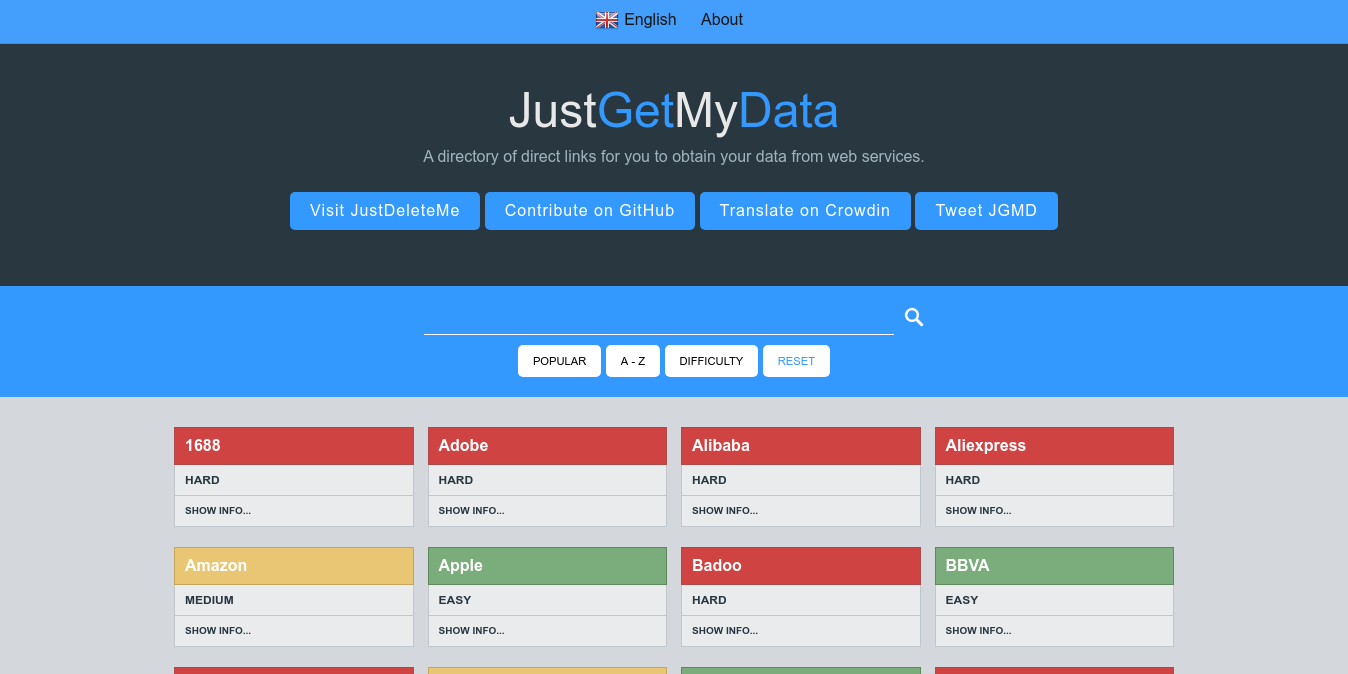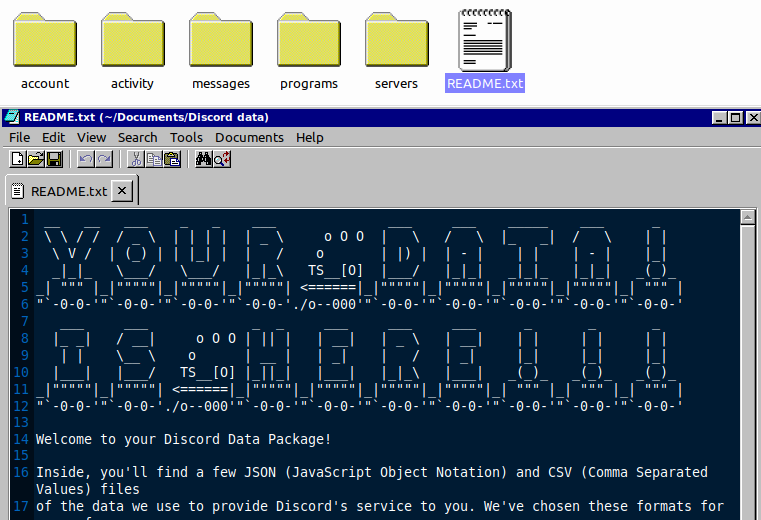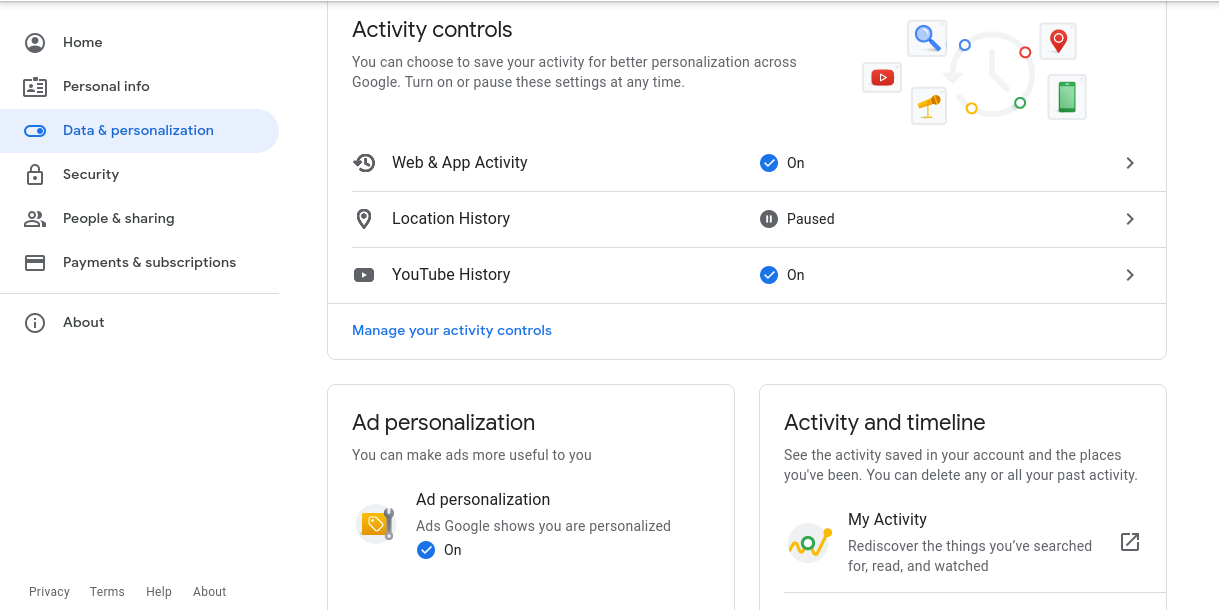Want to know what those data-hungry tech companies know about you? You can now use a free resource that will help you retrieve that data.
Events such as the Cambridge Analytica scandal have revealed how much data major tech companies collect and share, sometimes with unauthorized third parties. So how can you find out what personal details companies store? And how can you retake control of your privacy?
How to Get Your Data
Legislation such as the California Consumer Privacy Act obligate companies to make that data available to users. While these laws depend on your geographical locations, many companies will comply with a data request regardless of where you live, either for simplicity's sake or to avoid further legal action against them.
How these companies make your data available to you, however, can vary greatly, and it's not always an easy process to retrieve it.
A handy and aptly named tool in your quest is JustGetMyData, a website that simply lists major tech companies with links and instructions to acquire your account data from them.
The website is run by a community of people dedicated to putting privacy back in the hands of users. You can even jump in and contribute to their GitHub project if you'd like.
You'll see that each site receives a color-coded rating describing the level of difficulty in accessing your data. The possible ratings are: Easy, Medium, Hard, and Impossible.
Some platforms make it as easy as clicking a single button. Others require you to get in contact with a customer service representative through email or phone, sometimes a monumental task.
Whatever you're forced to do, finally accessing your data typically means downloading a compressed folder containing a series of files, often of varying extensions, such as .csv or .json.
A word of caution: Remember when downloading your data that you're no longer trusting only the platform to keep your data secure but, in addition, your personal device. If you're using an Android phone, for example, make sure it's secured.
What to Expect From Your Data Pull
Sifting through your data files can be a tremendous undertaking, particularly if your account has existed a long time. Understanding the meaning or purpose of some data is similarly not easy.
Some platforms will offer help with the data processing. For example, Discord provides a readme in your download, linking you to these instructions. There, Discord breaks down the contents of your data file and explains how to read it.
Some data points will certainly interest you more than others. It will of course include content you could find without requesting your data, like your messaging history and contact info you've provided.
A LinkedIn data pull, however, includes a fascinating file called "Inferences_about_you.csv", which includes facts LinkedIn has guessed about you based on your activity and profile contents.
Why Is Getting My Data So Difficult?
Many websites and apps use tactics called "dark patterns" to trick you into doing things you don't want to do, or prevent you from doing things they don't want you to do.
In the case of personal data, they want the process of giving them personal details to be easy if not unavoidable, but they also often want your accessing of that data to be difficult.
This can be frustrating, but you're not totally without power.
What Can I Do to Protect My Privacy?
Obviously, you can't just stop using the internet. So what can you do without totally inconveniencing yourself? There are a few options, depending on how drastic a change you're willing to make.
Express Your Dissatisfaction
Simply contacting a customer service representative to let them know how unhappy you are is one option. They'll often be obligated to report your dissatisfaction to higher authorities, especially if they receive a high number of sentiments similar to yours.
Since they rely on happy, active users, threatening to leave their service can be a strong statement.
A similar route is writing negative reviews about the platform. Feel free to report your experience and findings from your data requests. Since negative reviews are public and difficult to take down, they will attempt to address your concerns perhaps faster than a private conversation with customer service.
Modify Your Data Privacy Settings
Some websites allow you to adjust how much or how often data is collected through your account. Facebook, for example, lets you to change what is shared with third parties.
You may have the opportunity to erase previously collected data. In this case, however, you're completely trusting the company's word to actually delete your data and all backups they likely have.
You also have to understand that these privacy settings will always be limited in their scope. Your very use of the platform is going to result in some form of data collection.
Delete Your Account
You may simply want to delete your account so that data collection stops immediately. In these cases, you need to know the processes of deleting social media accounts or deleting a Google account.
You can also use JustDeleteMe, the website JustGetMyData forked from. It provides links and directions for deleting accounts on numerous platforms.
Be aware, however, that many large platforms, such as Facebook, possess capabilities to track you even if you've never been a registered user.
Move to Privacy-Focused Alternatives
If you're so unsettled by your findings that you no longer want to use some platforms, a number of competing web services exist that don't harvest your data for advertising or trick you with dark patterns.
Some of these services, while attempting to act as substitutes, often lack the comprehensive features that major platforms like Facebook and Google offer. Most, however, are actively developed to add features, like ProtonMail's ProtonDrive, a fully encrypted alternative to Google Drive. Gaining new users can only help its progress.
Finding and Protecting Your Data
While data collection remains a pervasive practice among tech companies, many tools and avenues exist that allow you to take your privacy back into your own hands.
Seeing so much private information being collated can seem overwhelming, but don't be afraid of taking back some level of control.




